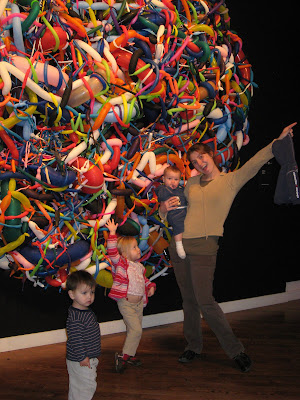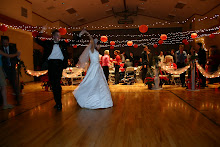I had my first prenatal appointment in Utah today, and can I just tell you how EXCITED I am to give birth!? Seriously. No sarcasm whatsoever. No, I am not a masochist and if giving birth was painless and comfortable, I would not complain. However, it is what it is and actually, I believe it to be one of life's most profound, empowering, and rewarding experiences. Or at least that it has the potential to be such.
I know some of my associations will already be retracting emotionally from my post at this point. That's okay. I'm not trying to convert anyone to my hypno- and water-birthing ways, nor do I cast an unfavorable judgment at anyone who chooses other birthing methods. It's a highly sensitive subject for most, so I want to clarify that lest anyone feel affronted. I'm just sharing some great things I've learned and pondered in case anyone happens to be interested (the rest of you feel free to skip the next 17 or so paragraphs). That is my intent, so if you start to feel offended, please stop reading so we can still be friends. =) (I threw in these pictures of strangers and their babies because this is the longest post I've ever written and even I have a hard time reading through it in one sitting without some cute visual distractions!)
(I threw in these pictures of strangers and their babies because this is the longest post I've ever written and even I have a hard time reading through it in one sitting without some cute visual distractions!)
The fact that I successfully birthed sans interventions (fetal monitoring, pitocin, epidural, forceps/tools, episiotomy, etc.) in a hospital notorious for being natural birth unfriendly, and with a doctor who completely disregarded several of the instructions I'd laid out for him on my birth plan is reeeeally going to make this birth a breeze. It was SO refreshing to sit down with my midwife today and have lengthy discussions about my birth questions, specific to me or spawning from general curiosity. I never felt like I was "just another patient" like I did with my obgyn who delivered three babies a day sometimes. Also, I know I don't need to justify any of my concerns or wishes with this midwife. She wants me to be in control of my own birth experience. Her philosophy is that a birth is about a family and the midwife should be involved as little as possible, according to the family's wishes.
How refreshing to view giving birth as something that I am doing, that I am fully capable of doing, without needing to be "delivered" (although I have no problem with the term colloquially, the connotation is a little disconcerting) by the oft-deemed-omniscient medical practitioner.
I haven't the slightest reservation about admitting myself into the hands of a stranger who has the credentials to treat me for pretty much any illness or injury. I am no hospital-hater. The reality is, though, that birth is NEITHER an illness NOR an injury. It just so happens to be a completely natural experience that has only become highly hospitalized in recent decades in the US. Americans choose hospital and obgyn births in greater proportions than people of nearly any other country. We also rank at the bottom of the list of developed countries when it comes to maternal and infant mortality rates (as in, why the heck are so many of our babies dying?!), and we also happen to use midwives much less often than our European counterparts.
Doctors can save certain lives than midwives cannot (who can do everything a doctor does --and a whole lot more!-- except for c-sections). This is why the 9-10% of pregnant women who have conditions categorizing them as "high risk" should birth in a setting equipped to handle immediate emergencies. For the remaining 90% of us, though, hospitals and obgyns are no safer than the alternative I'm choosing-- hospital birth supporters have never been able to produce a single valid stat showing that hospital birth is safest. In fact, oodles of studies present evidence that birthing outside of a hospital is even safer.
(Here's some good basic measures of birth safety and normalcy: WHO birth recommendations: /www.bellybelly.com.au/articles/birth/recommendations-for-birth-from-the-world-health-organisation)
The Lewis Mehl Study took 1046 births in two different groups, hospital births and home births. The couples were matched for age, parity, education, race and risk. What he found was that the fetal death rate was the same in both groups and there were no maternal deaths in either group. But what he did find was that the hospital group had:
• 9x’s more episiotomies, with more tearing
• 3x’s more c-sections
• 2x’s more oxytocin used
• 20x’s more forceps delivery
• 9x’s more analgesia and anesthesia used
• 6x’s more fetal distress
• 5x’s more maternal high blood pressure
• 3x’s more maternal hemorrhage
• 4x’s more infections
• 3x’s more aid for infant breathing
• 30x’s more birth injuries, including skull fracture and
nerve damage
(www.agapebirthservices.com/home_birth.htm)
After suffering through post-partum depression for much longer than was necessary, this study was of particular interest to me: "Aidan McFarlane, a British physician, notes that while 68% of hospital mothers experience postpartum depression , only 16% of home birth mothers do." (www.gentlebirth.org/ronnie/homejjg.html) This has to do with actual biochemical processes occurring in mom's body, "bonding" chemicals that are inhibited by the routine separation of mother and baby in hospitals.
Anyone else shocked after reading those stats? This is only the tip of the iceberg, believe me. I was surprised when I first encountered this information because I think most Americans (myself included) have always assumed that we birth in hospitals because it's safer. This information has given me much pause... the more I study this stuff, though, the more it makes perfect sense. One intervention begets another until the birth process has been so tampered with that an optimally safe and normal delivery is no longer possible.
Here's an example of the snowballing effect of interventions:
Consider epidurals... "Because epidurals frequently inhibit labor, it is likely that Pitocin, a drug used to induce contractions, will be needed. Contractions caused by Pitocin are typically stronger and more painful than natural contractions, so the epidural might be increased.
In addition to an increased risk of the mother’s blood pressure dropping, there is increased risk of fetal distress, thus increasing the likelihood of a Caesarian section." (birthing-options.suite101.com/article.cfm/review_the_business_of_being_born)
A c-section birth is not the end of the world, but it is a serious surgery bearing with it a dramatically increased risk of infection and blood loss, not to mention the pain of that incision, which I have heard is no cake walk.
Also from the above site, "According to the CDC report, thirty percent of babies in America are delivered by Cesarean section. In some hospitals, the rate approaches 50 percent. (--note that the WHO recommendation states there is no justification for having a c-section rate above 10-15%--)
While some doctors blame the high cost of malpractice suits for this figure, the documentary offers other explanations: excessive intervention, a new trend in elective C-sections, convenience to the doctor, and the desire for hospitals to move maternity patients quickly out of labor and delivery."
The above is just one illustration of how hospital births can end up being much riskier than home or center births. Exiting the surgery room, the doctor may be thinking, "Gee, it's good thing she birthed in a hospital because look at all the things that went wrong!" How many of those complications would have even arisen without the routine interventions of a hospital/ob setting? An individual may never know, but I think most people would be amazed to learn how many mothers are considered "high risk" by their doctors because of their birthing history (hemorrhage, multiples, c-section, pre-term labor, etc.) that are actually very much "low risk." There's no way to know for certain how your labor and delivery would have transpired without that first intervention and its chain reaction, but the studies do suggest that it had a good fighting chance of being a.o.k.If you get a beautiful baby out of your birth experience, well, of course that is what matters most. Still, that doesn't mean that your experience didn't matter at all, or that it couldn't and therefore shouldn't have been better (physically AND emotionally) for you and your baby.
 I can't completely fault doctors and nurses for diagnosing and intervening the way they do-- they do what they have been trained to do and understand it to be best for you. That's best-case scenario. They are also a business, and doctors have things to do, so don't be at all surprised if what is "best" for you just happens to also be best for the doctor's evening plans. "The Business of Being Born" by Ricki Lake (I know, I know, but it's much more credible than you'd expect her to be) is, I've heard, well worth viewing. View a preview here: www.thebusinessofbeingborn.com.
I can't completely fault doctors and nurses for diagnosing and intervening the way they do-- they do what they have been trained to do and understand it to be best for you. That's best-case scenario. They are also a business, and doctors have things to do, so don't be at all surprised if what is "best" for you just happens to also be best for the doctor's evening plans. "The Business of Being Born" by Ricki Lake (I know, I know, but it's much more credible than you'd expect her to be) is, I've heard, well worth viewing. View a preview here: www.thebusinessofbeingborn.com.American culture has taught women to fear childbirth. Giving birth is depicted the exact same way in every movie and tv show, and that's the same way we hear it recounted by mothers throughout their lives. I, too, expected that it was going to be terrible, I'd be screaming obscenities at my husband, and that eventually the doctor would rescue me, bringing my pain and humiliation to an end and at least I'd get a baby out of the scene of horror.
I propose that this is only one birthing scenario. Yes, a medically-oriented hospital birth is the most popular option, but in the majority of cases, it is not the safest option, nor the most peaceful, normal, or rewarding option. You'd be surprised how much your own woman's body understands about how to best birth a baby-- things not even a doctor on his 1,000,000th delivery can understand. One of the reasons I'm bothering ranting about all of this is because I feel the vast majority of American women simply aren't aware of what their full range of birthing options are, meaning a true understanding of the risks and benefits of each birthing choice. I must play my part in dispelling some of the many myths about midwives and out-of-hospital births!
I very far from understood the advantages of natural birth when I was pregnant with Ellie. I did a lot more research with Erik, but not until this pregnancy has all the information started to gel. Here's a good place to start reversing that terrifying, excruciating image of birth we have fostered in the US-- a Lamaze teacher addressing the simple question, "Why natural childbirth?", since only 10% of Americans today attempt it: http://www.pubmedcentral.nih.gov/articlerender.fcgi?artid=1595040.
 My reason for birthing Ellie naturally actually had nothing to do with safety, comfort, and avoiding the disadvantages of lithotomy/stirrups, epidural and c-section. The core of my decision had a much different base, one that would require a different discussion on a different day, and probably on a much more personal basis. I don't tell most people why I choose to birth naturally because it wouldn't make any sense to someone who understands birth only in the American hospital context.
My reason for birthing Ellie naturally actually had nothing to do with safety, comfort, and avoiding the disadvantages of lithotomy/stirrups, epidural and c-section. The core of my decision had a much different base, one that would require a different discussion on a different day, and probably on a much more personal basis. I don't tell most people why I choose to birth naturally because it wouldn't make any sense to someone who understands birth only in the American hospital context.Whatever the reasons may be, though, I am confident that giving birth is something my body was designed to do, and do it well. I've thought a lot over recent years about why childbirth was created in a way that leaves it vulnerable to stigmatizing, exploiting, humiliating, life-endangering, etc. for so very many mothers. I do believe it was created this way on purpose, and for good reason (not because Eve ate the fruit first so all women must be punished-- cuz that's pure crazy talk). I don't understand all of that good reason, but there is a part of it that I do get, and it has a lot to do with the environment and philosophy of a birth center and midwife.














































